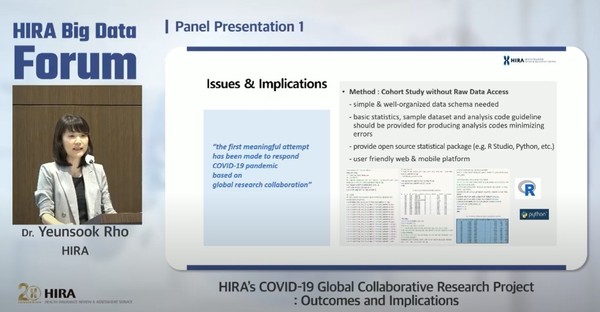The new coronavirus pandemic is still sweeping the world with no vaccine or treatment available. Researchers around the world have rolled up their sleeves to fight the unprecedented global crisis, but lack of clinical data hampered their efforts.
Research efforts started to gain momentum, however, since the Health Insurance Review and Assessment Service (HIRA) opened Korea’s healthcare data to international researchers in March as a part of the global response to Covid-19.
With accelerated Covid-19 studies, Korean researchers said it was just a matter of time before releasing an influential paper.
HIRA could swiftly disclose Korean healthcare data and start an international joint study because Korea had a national health insurance system. The local law also enabled HIRA to quickly review medical billings at hospitals and store them as national data.
On Wednesday, HIRA held a big data forum to share the international cooperation results in Covid-19 research and discuss future moves. The online forum was broadcast live on YouTube.
Overseas participants of the forum said the HIRA’s sharing data was an excellent example of how big data can be used for public health.
412 Covid-19 studies from 32 countries registered for joint response
On March 27, HIRA opened clinical data of domestic Covid-19 patients, whose personal information was anonymized, to respond to the pandemic jointly with international researchers. The agency built the patients’ clinical data as a cohort and shared the evidence without releasing raw data.

“The medical billing data collected by HIRA is very valuable because the healthcare service use of the entire population is stored chronologically, and the data includes details of individuals' medical use based on reimbursement per medical service,” said Roh Yeon-sook, Director of the Big Data Research Division at HIRA.
Korean Covid-19 patients' clinical data drew attention from researchers worldwide, who had difficulty getting clinical data and finally led to successful Covid-19 studies.
According to HIRA, 1,587 researchers (527 domestic, 1,060 overseas) from 58 countries have registered to the “Global Research Collaboration Project on Covid-19 Platform” from March 27 to Aug. 31. For the research collaboration, researchers from 32 countries submitted 412 study proposals (181 domestic, 231 overseas).
Out of the 412 proposals, 129 were executed. Countries with many Covid-19 cases, such as Korea, the U.S., the U.K., Canada, and Italy, actively participated in the collaborative research project. By field, 32 papers were related to drugs, 26, Covid-19 characteristics and causes, and 8, others.
The data sets used for the project included the medical service use data of Covid-19 patients extracted as of May 15, and their medical service use data for the past three years. These two data sets had four tables -- general information, medical history, injuries or disease information, and outpatient prescription information.
“As the Korean government and the national health insurance program covered all the Covid-19 treatment expenses, patients had easy access to medical care, and medical institutions quickly charged bills. So, we could provide standardized data at the right timing,” Roh said.
She went on to say that studies were still ongoing and starting to produce outcomes.
“I feel grateful for research participants, and it is rewarding to see the result of HIRA’s hard work,” she added.
Participants of the forum said HIRA’s sharing of data showcased how healthcare big data could be utilized for public health in the world.
Patrick Ryan, Vice President of Janssen Research and Development, said HIRA’s leadership and its valuable data showed how big data could be used for public health in the future.
Ryan proposed expanding the research collaboration by opening big data to research other areas such as cardiovascular diseases, cancer, and rheumatism to improve public health quality and advance the global medical industry.
Standardizing data remains a challenge
HIRA’s research collaboration project on Covid-19 was a new study method to overcome the unprecedented global crisis. However, to yield a meaningful result, HIRA has to address the issue of standardizing data.
Over 1,500 researchers have registered to the HIRA’s project and proposed over 420 studies but executed only 129, Roh noted.
“This means that they had difficulty in analyzing data or getting access to data,” she said.
Roh noted that standardizing data was key to make global cooperative research smooth when using HIRA’s data.
HIRA’s project was possible because the agency did not open the raw data but built cohort data sets and shared the evidence only, she went on to say. However, researchers must have found it hard to explore data directly and write detailed analysis codes.
“In the future, HIRA will need to present basic statistics of cohort data, large-sized sample data that has been de-identified, and basic analysis guidelines for each statistical package,” she said.
Professor Heo Yeon-jung at Ajou University also raised the need for standardizing data to create diverse vales in areas other than infectious diseases.
The government also needs to make standardizing issues more systemic, she said.
HIRA’s data alone cannot create various values while healthcare big data has many issues untouched, Heo said.
“We have to link data of public institutions or medical institutions to utilize various types of big data, but we have a weak legal basis for doing so,” she said. “As some raise the issue of personal information protection, the government needs to address it by establishing an adequate system.”

